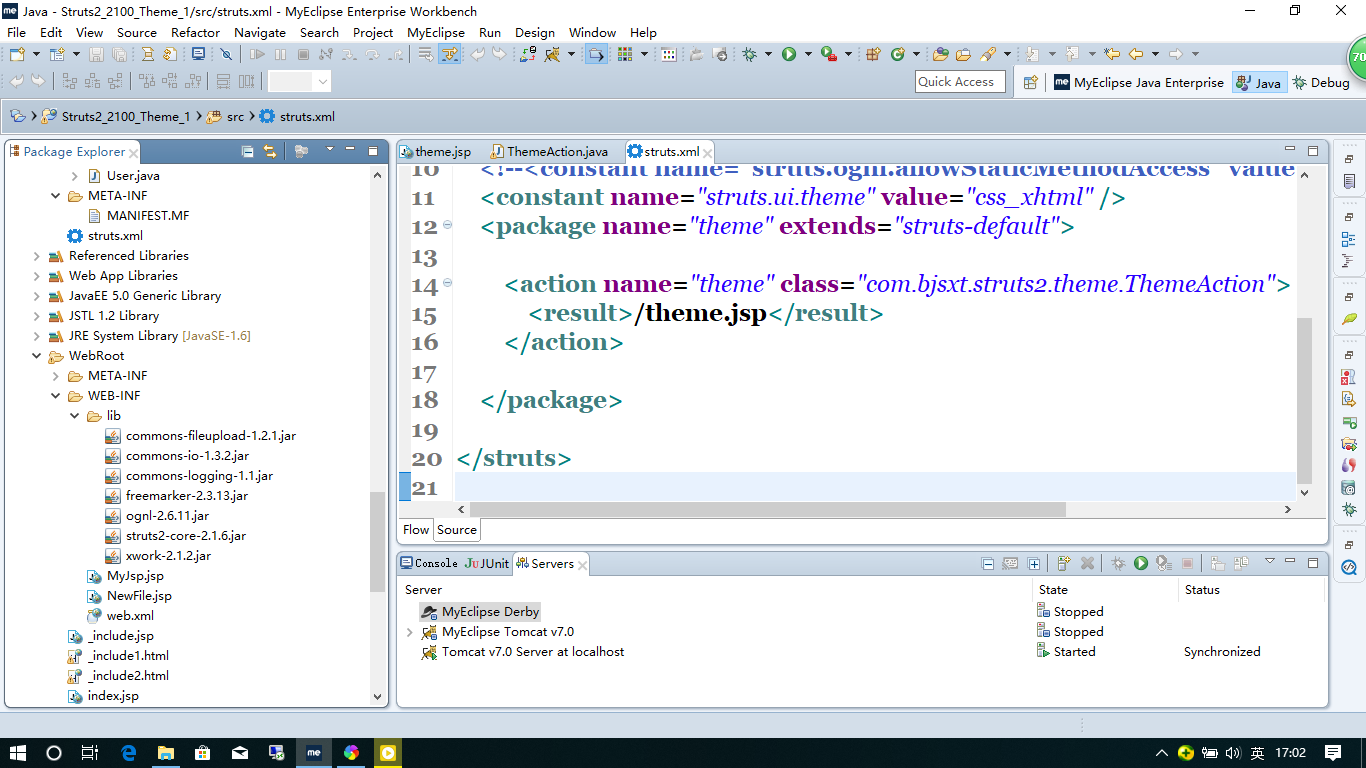Structs复习 Structs标签
如果类型是object Structs会把它默认解析为OGNL表达式
想取字符串的话就 ‘’ ‘ ’ ‘’
jar包

web.xml、
<?xml version="1.0" encoding="UTF-8"?> <web-app version="2.5" xmlns="http://java.sun.com/xml/ns/javaee" xmlns:xsi="http://www.w3.org/2001/XMLSchema-instance" xsi:schemaLocation="http://java.sun.com/xml/ns/javaee http://java.sun.com/xml/ns/javaee/web-app_2_5.xsd"> <welcome-file-list> <welcome-file>index.jsp</welcome-file> </welcome-file-list> <filter> <filter-name>struts2</filter-name> <!--<filter-class>org.apache.struts2.dispatcher.FilterDispatcher</filter-class>--> <filter-class>org.apache.struts2.dispatcher.ng.filter.StrutsPrepareAndExecuteFilter</filter-class> </filter> <filter-mapping> <filter-name>struts2</filter-name> <url-pattern>/*</url-pattern> </filter-mapping> </web-app>
Structs.xml
<?xml version="1.0" encoding="UTF-8" ?> <!DOCTYPE struts PUBLIC "-//Apache Software Foundation//DTD Struts Configuration 2.0//EN" "http://struts.apache.org/dtds/struts-2.0.dtd"> <struts> <!--<constant name="struts.enable.DynamicMethodInvocation" value="false" />--> <constant name="struts.devMode" value="true" /> <!--<constant name="struts.ognl.allowStaticMethodAccess" value="true"></constant>--> <constant name="struts.ui.theme" value="simple" /> <package name="tags" extends="struts-default"> <action name="tags" class="com.bjsxt.struts2.tags.TagsAction"> <result>/tags.jsp</result> </action> </package> </struts>
Dog.java
package com.bjsxt.struts2.tags; public class Dog { private String name; public Dog() { } public Dog(String name) { super(); this.name = name; } public String getName() { return name; } public void setName(String name) { this.name = name; } @Override public String toString() { return "dog: " + name; } }
S.hava
package com.bjsxt.struts2.tags; public class S { public static String STR = "STATIC STRING"; public static String s() { return "static method"; } }
TagsAction.java
package com.bjsxt.struts2.tags; import com.opensymphony.xwork2.ActionSupport; public class TagsAction extends ActionSupport { private String password; private String username; public TagsAction() { } public String execute() { this.addFieldError("fielderror.test", "wrong!"); return SUCCESS; } public String getPassword() { return password; } public String getUsername() { return username; } public void setPassword(String password) { this.password = password; } public void setUsername(String username) { this.username = username; } }
User.java
package com.bjsxt.struts2.tags; public class User { private int age = 8; public User() { } public User(int age) { super(); this.age = age; } public int getAge() { return age; } public void setAge(int age) { this.age = age; } @Override public String toString() { return "user" + age; } }
index.jsp
<?xml version="1.0" encoding="GB18030" ?> <%@ page language="java" contentType="text/html; charset=GB18030" pageEncoding="GB18030"%> <% String path = request.getContextPath(); String basePath = request.getScheme()+"://"+request.getServerName()+":"+request.getServerPort()+path+"/"; %> <!DOCTYPE html PUBLIC "-//W3C//DTD XHTML 1.0 Transitional//EN" "http://www.w3.org/TR/xhtml1/DTD/xhtml1-transitional.dtd"> <html xmlns="http://www.w3.org/1999/xhtml"> <head> <meta http-equiv="Content-Type" content="text/html; charset=GB18030" /> <title>Insert title here</title> </head> <body> 访问属性 <a href="http://localhost:6666//Struts2_2000_StrutsTags/tags.action?username=u&password=p">tags</a> </body> </html>
具体用法建议使用的时候再回来参考
<?xml version="1.0" encoding="GB18030" ?> <%@ page language="java" contentType="text/html; charset=GB18030" pageEncoding="GB18030"%> <%@ taglib uri="/struts-tags" prefix="s" %> <!DOCTYPE html PUBLIC "-//W3C//DTD XHTML 1.0 Transitional//EN" "http://www.w3.org/TR/xhtml1/DTD/xhtml1-transitional.dtd"> <html xmlns="http://www.w3.org/1999/xhtml"> <head> <meta http-equiv="Content-Type" content="text/html; charset=GB18030" /> <title>Struts-Tags学习</title> </head> <body> <ol> <li>property: <s:property value="username"/> </li> <li>property 取值为字符串: <s:property value="'username'"/> </li> <li>property 设定默认值: <s:property value="admin" default="管理员"/> </li> <li>property 设定HTML: <s:property value="'<hr/>'" escape="false"/> </li> <hr /> <li>set 设定adminName值(默认为request 和 ActionContext): <s:set var="adminName" value="username" /></li> <li>set 从request取值: <s:property value="#request.adminName" /></li> <li>set 从ActionContext取值: <s:property value="#adminName" /></li> <%--<li>set 设定范围: <s:set name="adminPassword" value="password" scope="page"/></li> <li>set 从相应范围取值: <%=pageContext.getAttribute("adminPassword") %></li> --%> <li>set 设定var,范围为ActionContext: <s:set var="adminPassword" value="password" scope="session"/></li> <li>set 使用#取值: <s:property value="#adminPassword"/> </li> <li>set 从相应范围取值: <s:property value="#session.adminPassword"/> </li> <hr /> <%--<li>push:<s:set name="myDog" value="new com.bjsxt.struts2.ognl.Dog('oudy')"></s:set></li> <li> push:<s:push value="#myDog"> <s:property value="name"/> </s:push> </li> <li>push: <s:property value="name"/></li> --%> <hr /> <li>bean 定义bean,并使用param来设定新的属性值: <s:bean name="com.bjsxt.struts2.tags.Dog" > <s:param name="name" value="'pp'"></s:param> <s:property value="name"/> </s:bean> </li> <li>bean 查看debug情况: <s:bean name="com.bjsxt.struts2.tags.Dog" var="myDog"> <s:param name="name" value="'oudy'"></s:param> </s:bean> 拿出值: <s:property value="#myDog.name"/> </li> <hr /> <li>include _include1.html 包含静态英文文件 <s:include value="/_include1.html"></s:include> </li> <li>include _include2.html 包含静态中文文件 <s:include value="/_include2.html"></s:include> </li> <li>include _include1.html 包含静态英文文件,说明%用法 <s:set var="incPage" value="%{'/_include1.html'}" /> <s:include value="%{#incPage}"></s:include> </li> <hr /> <li>if elseif else: age = <s:property value="#parameters.age[0]" /> <br /> <s:set var="age" value="#parameters.age[0]" /> <s:if test="#age < 0">wrong age!</s:if> <s:elseif test="#parameters.age[0] < 20">too young!</s:elseif> <s:else>yeah!</s:else><br /> <s:if test="#parameters.aaa == null">null</s:if> </li> <hr /> <li>遍历集合:<br /> <s:iterator value="{1, 2, 3}" > <s:property/> | </s:iterator> </li> <li>自定义变量:<br /> <s:iterator value="{'aaa', 'bbb', 'ccc'}" var="x"> <s:property value="#x.toUpperCase()"/> | </s:iterator> </li> <li>使用status:<br /> <s:iterator value="{'aaa', 'bbb', 'ccc'}" status="status"> <s:property/> | 遍历过的元素总数:<s:property value="#status.count"/> | 遍历过的元素索引:<s:property value="#status.index"/> | 当前是偶数?:<s:property value="#status.even"/> | 当前是奇数?:<s:property value="#status.odd"/> | 是第一个元素吗?:<s:property value="#status.first"/> | 是最后一个元素吗?:<s:property value="#status.last"/> <br /> </s:iterator> </li> <li> <s:iterator value="#{1:'a', 2:'b', 3:'c'}" > <s:property value="key"/> | <s:property value="value"/> <br /> </s:iterator> </li> <li> <s:iterator value="#{1:'a', 2:'b', 3:'c'}" var="x"> <s:property value="#x.key"/> | <s:property value="#x.value"/> <br /> </s:iterator> </li> <li> <s:fielderror fieldName="fielderror.test" theme="simple"></s:fielderror> </li> </ol> </body> </html>
include.jsp
<?xml version="1.0" encoding="GB18030" ?> <%@ page language="java" contentType="text/html; charset=GB18030" pageEncoding="GB18030"%> <%@ taglib uri="/struts-tags" prefix="s" %> <!DOCTYPE html PUBLIC "-//W3C//DTD XHTML 1.0 Transitional//EN" "http://www.w3.org/TR/xhtml1/DTD/xhtml1-transitional.dtd"> <html xmlns="http://www.w3.org/1999/xhtml"> <head> <meta http-equiv="Content-Type" content="text/html; charset=GB18030" /> <title>_include</title> </head> <body> params :<br /> 使用property取参数:p1=<s:property value="#parameters.p1"/> <br /> 使用property取参数:p2=<s:property value="#parameters.p2"/> <br /> 使用property取参数:p3=<s:property value="#parameters.p3"/> <br /> </body> </html>
_include1.html



 浙公网安备 33010602011771号
浙公网安备 33010602011771号